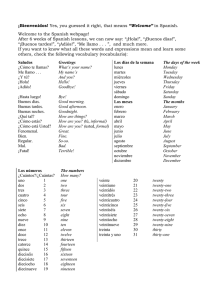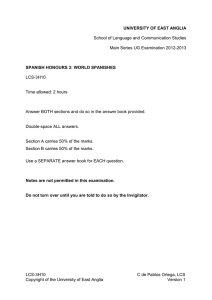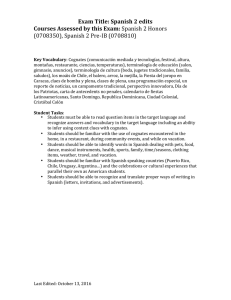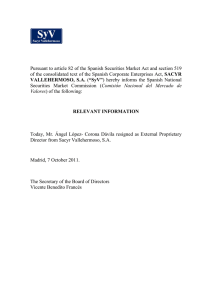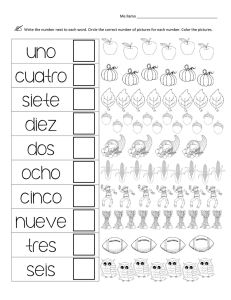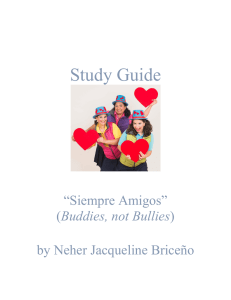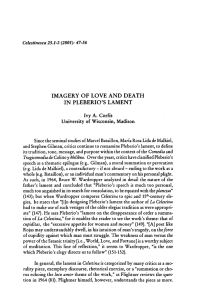Study Guide - Teatro de la Luna
Anuncio
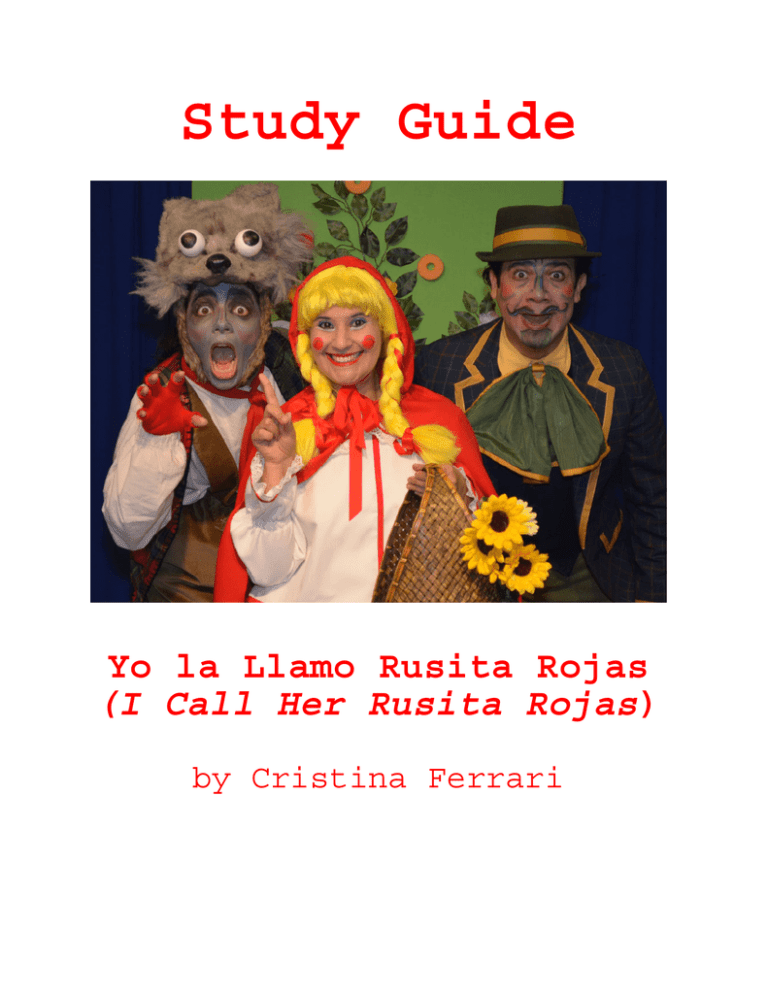
Study Guide Yo la Llamo Rusita Rojas (I Call Her Rusita Rojas) by Cristina Ferrari Yo la Llamo Rusita Rojas Study Guide Teatro de la Luna Table of Contents Synopsis of Story ………………………………………………………………………….. 3 Spanish Vocabulary, Translations and Enunciation Guide ………………………………... 4 Spanish Phrases with Translations and Enunciation Guide ……………………………....... 5 Theater Vocabulary in Spanish and English ……………………………………………….. 6 Biography of Jacqueline Briceño, Director ……………………………………….…….…. 8 Performance-Related Classroom Activities: 1) Pre-K through 1st Grade ………………………………………………………... 9 2) 2nd through 4th Grade …………………………………………………………. 3) 5th through 8th Grade ………………………………………………………….. Yo la Llamo Rusita Rojas Study Guide Teatro de la Luna Synopsis of the Story “I Call Her Rusita Rojas” is an adaptation of Charles Perrault’s classic fairytale “Little Red Riding Hood”. In this version, a police inspector tries to solve the wolf’s strange disappearance. The only witness is Rusita, a very talkative, smart, but frustrating girl. She tells the events from her viewpoint, even as the wolf himself appears and disappears to retell parts of the story from his way of thinking. These contradictions leave the inspector struggling to reach a conclusion. During the course of the play, the three characters return to the story’s origin: the pages of a storybook on which a child has fallen fast asleep. Lively, fun and instructive, the play makes us reflect on the importance of enjoying childhood and a healthy fantasy life. Yo la Llamo Rusita Rojas Study Guide Teatro de la Luna Spanish Vocabulary with English Translations by Grade Level Pre-K Through 1st Grade: abuela (ah-Boo-eh-la) …………. grandmother alguien (AHL-gee-n) ……………… someone años (AH-nios) …………..……………. years árbol (ARE-bowl) ………………………. tree callar (kah-YAR) ………………. to keep quiet capa (CAH-pah) ……………………….. cape cara (CAR-ah) ………………………….. face casa (CAH-sah) ……………………….. house cerrar (seh-RAHR) ………………….. to close claro (CLAH-row) …………………….. clear colores (co-LORE-s) ………………. colors comer (co-MARE) …………………….. to eat continua (cohn-TEA-new-ah) ……… continue delicioso (day-lee-see-OH-sow) ….. delicious día (DEE-ah) …………………………… day dormido (door-ME-dough) …………... asleep edad (eh-DAHD) ………………………... age feo (FAY-oh) …………………………… ugly flores (FLOOR-ehs) ………………… flowers fresa (FREH-sah) ……………….... strawberry gordo (GORE-dough) ……………………. fat grande (GRAHN-deh) ……………...…….. big grito (GREE-toe) ……………………. yell/cry (la) historia (lah ee-STORE-ee-ah) .(the) story lobo (LOW-bow) …………………….…. wolf mejor (may-HORE) …………………… better mundo (MOON-dough) ……………….. world nada (NAH-dah) ……………………... nothing niña (KNEE-niah) …………………………girl niños (KNEE-niohs) …………………. children nadie (NAH-deeay) ………………….... no one ojos (OH-hoes) ………………………….. eyes orejas (or-RAY-hahs) ……………………. ears palabra (pah-LA-brah) ………………….. word pájaros (PAH-ha-rose) ………………...... birds pequeño (pay-KAY-nio) ……………..…... little perdida (pair-DEE-dah) ……………..…... lost piedras (pea-AI-drahs) ………………….. rocks pobre (POH-bray) ………………………. poor pueblo (POOAI-blow) …………..…...…. town reír (ray-EAR) ………………………... to laugh rojo (ROW-ho) ………………………….… red 2nd Through 4th Grade: acercar (ah-sair-CAHR) ……..… to come closer amistoso (ah-me-STOW-sew) ……….... friendly animalito (ah-knee-mahl-LEE-toe) little animal arco iris (ARE-co EE-rees) …………… rainbow ayudar (ai-you-DAR) ……………..….… to help bosque (BOWS-kay) ……………..…..…. woods camino (cah-ME-no) ………………… road/path cesta (SAYS-tah) …………………..…..... basket contestar (cohn-tais-TAR) …………… to answer coser (co-SAIR) ………………………… to sew cosquillas (kos-KEY-yahs) ……………. tickling crecer (cray-SAIR) ………………… to grow up cuerpo (coo-AIR-poh) ……………………. body ¡detente! (day-TEN-tay) ……...………….. stop! enojar (ain-oh-HAR) ………….…... to get angry entonces (ain-TONE-says) ….……….……. then escuchar (ais-coo-CHAR) ….…….…… to listen extraño (aiks-TRAHN-nio) …..………..… strange fantasía (fahn-tah-SEE-ah) .………….… fantasy ¡siéntate! (seeAIN-tah-tay) ………..…...…… sit! feroz (fair-ROTHz) ………………………. fierce galletitas (gah-yay-TEA-tahs) .……. little cookies haragán (are-ah-GAHN) ……….…… lazy person infinidad (een-fee-knee-DAHD) .....……... infinity interrumpir (een-tair-room-PEER) ……. interrupt leñador (lay-nya-DOOR) …………… woodcutter loco (LOH-coh) …………………………… crazy mentir (main-TIER) ………………….. to tell a lie miel (me-ALE) ……………………..……... honey movimiento (moe-vee-me-N-toe) ……. movement nervioso (nair-vee-OH-sew) ……………. nervous horno (OR-no) …………………………….. oven panza (PAHN-thza) …………………….…... belly seguir (say-GEER) ………………..…… to follow sencillo (sain-SEE-;yo) …………………... simple serio (SAIR-ee-oh) ……………………….. serious silencio (see-LAIN-see-oh) …..…..…........ silence soñar (sew-NYAR) ………………..……. to dream tesoro (tay-SORE-row) ……………......... treasure Yo la Llamo Rusita Rojas Study Guide Teatro de la Luna 5th Through 8th Grade: abalanzar (ah-baa-lanth-ZAR) ..… to rush forward actitud (ahk-tea-TOOD) …….……attitude/posture alimentar (ah-lee-main-TAR) ………....….. to feed almendra (ahl-MAIN-drah) …………...…. almond apiadar (ah-pea-ah-DAR) ………... to move to pity aprovechar (ah-pro-vay-CHAR) to take advantage arriesgar (are-ee-ace-GAR) ……………….. to risk atentar contra (ah-tain-TAHR COHN-tra) …… to commit an outrage against colibrí (coh-lee-BREE) …………..... hummingbird colmo (COHL-moe) ………..…… the height/limit cómplice (COMB-plea-say) ………..... accomplice comportámonos (comb-poor-TAY-moe-nos) ……...…….... lets carry ourselves comprometer (comb-pro-may-TAIR) ……………..……… to jeopardize charlatan/a (char-la-TAHN/ah) ………....… chatterbox/trickster de repente (day ray-PAIN-tay) …....….... suddenly estómago (ais-TOE-mah-go) …………... stomach fábulas (FAH-boo-lahs) ………………..…. fables gravedad (grah-VEH-dahd) ........................ gravity gruñón (grew-KNEEOWN) …………….... grumpy insolente (een-sole-AIN-tay) ………......… insolent investigando (een-vase-tea-GAHN-doe) ………………………... investigating muñeco (moo-NYAI-ko) ……….… dummy/puppet notorio (no-TORE-ee-oh) ……...…….… notorious ofuscar (oh-foos-CAR) ……………..… to confuse panecillo (pahn-ai-SEE-yo) ……….… roll (bread) paradero (pah-rah-DARE-oh) …….... whereabouts pista (PEAS-tah) …………………….… track/trail pretigio ( pray-TEA-he-oh) ..………...….. prestige prosigue (pro-see-GEH) ……….……….. proceed pruebas (proo-EH-bahs) …………..…..… proofs sospechoso (soes-peh-CHOE-so) ….…. suspicious tamaño (tah-MAHN-nio) ……………..….…... size tenebroso (teh-neh-BRO-so) …..… gloomy/dismal Spanish Phrases with English Translations No me acuerdo. (No may ah-CWER-dough) …………….. Un sexto sentido (ooon SAYKS-toe sain-TEA-dough) …... ¡Al punto! (al POON-toe) ……………………………….. perder el tiempo (pair-DARE l tee-M-po) ………………. cuentos de hadas (coo-N-toes day AAH-das) …………… I don’t remember a sixth sense Get to the point! to lose time fairy tales Yo la Llamo Rusita Rojas Study Guide Teatro de la Luna Vocabulario de Teatro Theater Vocabulary Autor (auw-TORE) Actor/Actriz Playwright: The person who wrote the play. Actor/Actress: The men and women who play the parts onstage. (ahk-TORE/ahk-TREESTH) Director (dee-reck-TORE) Director: The person who picks the actors and tells them what to do. Escena/Escenario/ Scene/Stage/Scenery: All words related to the stage. The scene is the Escenografía location where each part of a play takes place; the stage is the place (ai-SAIN-ah, where the actors work, and the scenery is what they act in front of. ai-sain-ARE-ee-oh, ai-sain-oh-grah-FEE-ah) Fotografía Photography. Photos have to be taken of all shows – for publicity, for (foe-tow-grah-FEE-ah) program covers, and for reminders. Maquillaje (mah-key-YA-hay) Makeup: All actors, both women and men, wear stage makeup to Musicalización make them more visible from the audience. Music Design: Selecting what music is used for the play. (moo-see-cah-lee-tha-see-OWN) Producción Production: The people who organize everything about the play, (pro-duke-see-OWN) including who will direct it, who will design and build the set, and where the costumes come from. Sonido (sow-NEE-doe) Sound: Not just music is used during a play; many times there are other sounds involved, too. Vestuario (ves-too-ARE-ee-oh) Costumes: What the actors wear to make them look different. Utilería (oo-teel-air-EE-ah) Properties: everything that an actor uses onstage (such as the Old Woman’s embroidery). Yo la Llamo Rusita Rojas Study Guide Teatro de la Luna Biography of Neher Jacqueline Briceño Director A Venezuelan, Neher Jacqueline Briceño began acting in 1973 when she joined the University Theater children’s theater group at the University of Carabobo in Venezuela. Later she found that she liked other parts of theater better, and became a producer, director and writer. She was worked in children’s theater for 20 years, including more than 40 productions. She has won many awards for her artistic work. In 1997, now living in Miami, she started the Miami Children’s Theatre, which was invited to perform at Teatro de la Luna’s 2nd International Festival of Hispanic Theater. She has written and directed many of la Luna’s plays for children, including ‘The Adventures of Pinocchio,’ ‘The Sleeping Beauty,’ ‘Hansel and Gretel’, ‘ABE: a Dream Fulfilled’, ‘The Cat and the Seagull’ and ‘Drops of Water’. Yo la Llamo Rusita Rojas Study Guide Teatro de la Luna Performance Related Classroom Activities by Grade Level Pre-K Through First Grade: Spanish/Colors: What color is the cape worn by Rusita Roja? Have students find other items in the classroom (or their clothes) that are the same color. Practice saying the word “rojo” together. Science/Art/Spanish: Much of the story takes place in the woods (el bosque). Ask each student to draw and color a tree (un árbol) , then cut out the trees and create a forest of all of them on a bulletin board or large paper. As the students are working, you can talk about other things that live in the woods (ex. “Do penguins live in the woods? How about squirrels?”). Spanish/English Vocabulary: Many of the vocabulary words are parts of our faces. How many can the students identify in English and in Spanish? Safety/Critical Thinking: Was it wise for Rusita Roja to talk with the Wolf? Ask students why talking to strangers is a bad idea or a good idea. Second through Fourth Grades: Spanish/Critical Thinking/Imagination: The Inspector thinks Rusita Roja is telling lies (mentiras). Ask students why it might seem like she is lying. Using the Spanish word, ask students how they might talk about their trip to school so it might seem like a lie. English/Spanish: Why is Rusita Roja given that name? Ask students if they have ever called something by an incorrect name when they were younger (ex. “pisgetti” instead of “spaghetti”). Science/Spanish/Critical Thinking/Art: The Wolf (Lobo) is the villain of the play. Are wolves really evil? Where do wolves live? What are their families like? Do students know any stories where wolves are good (ex. “The Jungle Book” by Kipling, and Disney’s film adaptation). Ask students to draw and color a wolf; not the actor playing him, but what they think the Wolf really looked like. Spanish/Literature: Food is very important in this story, from Rusita Roja’s description of the delicious things in her basket (miel de la más rica y pura, pasteles de fresa, panecillos de almíbar, dulces de almendra) to the Wolf eating both the Granny and Rusita Roja. What other stories do the students know where food is important (ex. “Snow White” and the poisoned apple)? Fifth through Eighth Grades: Spanish/Writing: There are many legalistic terms in the play (cómplice, investigando, proseguir, pruebas). Ask students to use these words, either in English or Spanish, in a short story they write either alone or with partners. Spanish/Vocabulary/Critical Thinking: Using some of the adjectives in the vocabulary (sospechoso, tenebroso), have students create characters with those characteristics. They can either write about the characters or act them out. Literature/Critical Thinking: This play is loosely based on Charles Perrault’s “Little Red Riding Hood”. How is Perrault’s version different from that of The Brothers Grimm, or other versions of “Red Riding Hood”? Spanish/English/Critical Thinking: One of the vocabulary phrases is “a sixth sense” (un sexto sentido). What does this mean? When might a sixth sense be useful?
